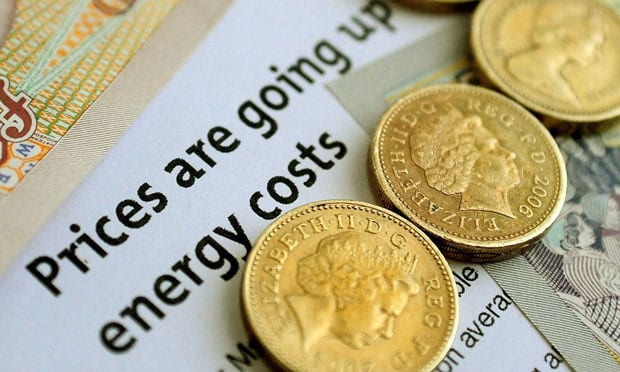The 25% tax is only on selected profits of oil and gas companies, mainly North Sea profits of what the legislation calls “ring fence trade”.

Prem Sikka is an Emeritus Professor of Accounting at the University of Essex and the University of Sheffield, a Labour member of the House of Lords, and Contributing Editor at Left Foot Forward.
The average UK annual domestic energy bill is expected to hit £3,300 this winter, a rise of nearly £2,000, from £1,277 in March. Millions of people are facing hardship. The main cause is profiteering by oil, gas and energy companies.
The market price of oil and gas has rocketed but the cost of producing oil and gas has remained substantially unchanged. The companies are making extraordinary profits without additional investment, effort or risks. Therefore, windfall taxes need to be levied to clawback underserved profits and help the less well-off. Greenpeace has called for a windfall tax rate of 70%.
To assuage public anger, the government is to levy a 25% windfall tax on oil and gas companies, which it claims will generate net £5 billion for the year beginning 26 May 2022 and partly fund the help being given to households.
However, the legislation rushed through parliament is full of sleight of hands. The 25% tax is only on selected profits of oil and gas companies, mainly North Sea profits of what the legislation calls “ring fence trade”. It is not a charge on their total UK profits.
The windfall tax is accompanied by sweeteners. Oil and gas companies will receive an 80% investment allowance for “new” investment in fossil fuels. For every £100 invested, they will receive a subsidy of £91. The government has failed to provide any data about the value and benefits of the subsidy.
The legislation opens the gates for tax avoidance as the companies can lease second-hand assets and claim the investment allowance. The oil and gas produced with public subsidies need not be sold to UK households.
Interestingly, for every £100 invested in renewable energy, the investors receive a tax relief of £25, and from April 2023 this will decline to only £4.50. One possible explanation for indulgence of fossil fuel companies is that they have been rewarded for funding the Conservative Party.
Despite the ritual protests, the impact of the 25% windfall tax on oil companies is minimal as only selected UK profits are targeted. Only about 5% of BP’s consolidated production is based in the UK. Expert opinion is that the windfall tax will account for less than 2% of its Earnings Before Interest Tax Depreciation and Amortisation (EBITDA), hardly onerous. Its 2021 EBITDA was around $23bn and it is awash with cash.
For the first quarter of 2022, BP’s profits more than doubled to $6.2bn (£5bn) and it is handing $4.15bn to shareholders. In 2021, BP paid $127.3m corporation tax on annual profits of $12.8bn. It is the first time in the last six years that it paid tax. .
Only about 3% of Shell’s consolidated production is based in the UK and the windfall tax will account for less than 2% of its EBITDA. The company is loaded with cash. In the first quarter of 2022, it tripled its profits to $9.1bn and has handed $8.5bn to shareholders through a share buyback programme. Shell paid no tax on its North Sea oil and gas operations for the fourth consecutive year.
Energy companies speculate on oil and gas prices to push them up. BP alone employs more than 3,000 traders to do that and is estimated to generate $2bn – $3bn profit from such speculation, whilst Shell has notched $4bn profit a year. None of this is subject to windfall tax.
Between June 2021 and June 2022, the refiners’ margins on petrol and diesel increased by 366% and 648% to create bumper profits. BP reported an average refinery profit margin of $18.90 per barrel during the first quarter of 2022. That’s nearly three times the $6.70 per barrel margin reported in 2020. Shell’s refining profit margin rose in the second quarter of 2022 to $28.04 per barrel from $10.23 a barrel in the first quarter and $4.17 a year earlier.
The Competition and Markets Authority states that there is a growing gap between the price of crude oil when it enters refineries, and the wholesale price when it leaves refineries as petrol or diesel. This has added 24p to a litre to the price of fuel.
The windfall tax does not apply to refining profits.
Petrol retailers, which include oil companies, are quick to hike prices and slow to pass on falling costs. Retail profiteering is not covered by windfall tax.
The government has ruled out a windfall tax on profits of electricity generating companies.
Banks, supermarkets, water and other companies are profiteering too, but are not subjected to a windfall tax.
Altogether, the windfall tax on oil and gas is a huge impression management exercise. It won’t make a serious dent in the coffers of oil and gas companies and will not check profiteering. Many profitable activities are excluded from the scope of the tax. The government is not investigating the failure of oil and gas companies to pay UK corporation tax. It is giving them more tax perks rather than abolishing them. It is not reviewing its own policies which result in the UK collecting only $1.72 in taxes per barrel of oil, while the Norwegian government collects $21.35.
Left Foot Forward doesn't have the backing of big business or billionaires. We rely on the kind and generous support of ordinary people like you.
You can support hard-hitting journalism that holds the right to account, provides a forum for debate among progressives, and covers the stories the rest of the media ignore. Donate today.



